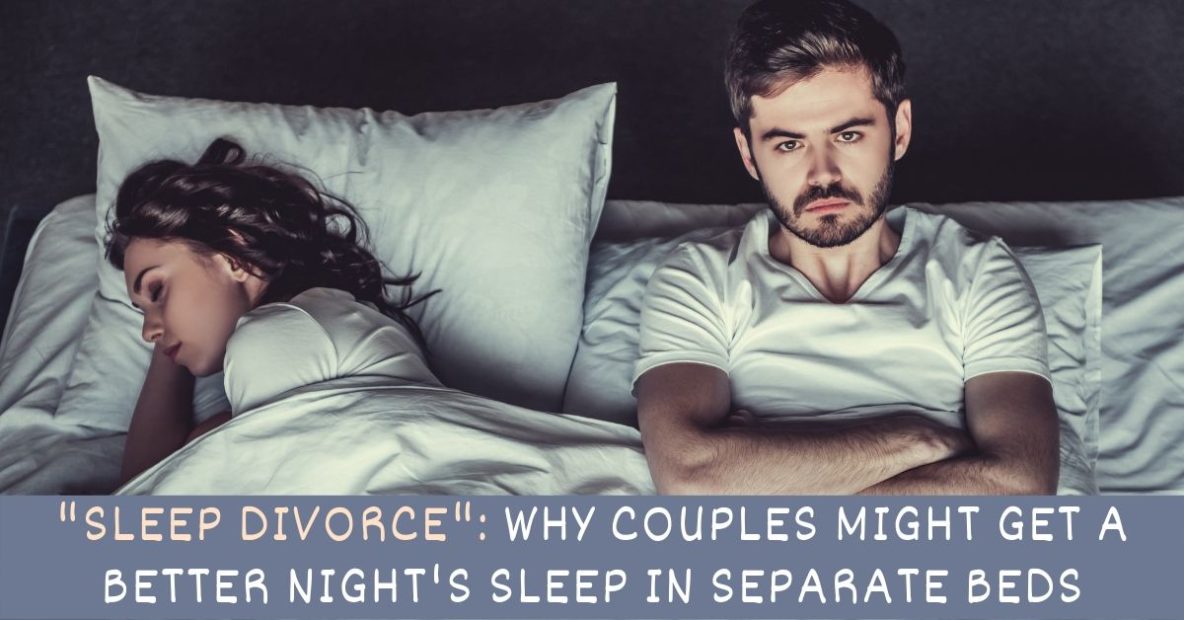“Sleep Divorce”: Why Couples Might Get a Better Night’s Sleep in Separate Beds

- A Promising Paradigm Shift: New Research Challenges the CPAP-First Approach to OSA Treatment - September 5, 2023
- Understanding Sleep Meditation Techniques - July 30, 2021
- How Online Learning Has Affected Sleep for Students - July 13, 2021
Do you sleep in the same bed as your partner? Most couples share a bed, but research suggests that this could be having a negative impact on your sleep cycle. If you’ve been struggling to fall asleep, stay asleep, and get the rest you need, it may be time for a “sleep divorce”: where you and your partner sleep in separate beds.
Trouble Sharing a Bed
Couples say they love sharing a bed. It’s a chance to cuddle, be intimate, and unwind after a busy day. However, sharing a bed with your loved one could be affecting your sleep more than you realize. Does your partner snore, or wake you up in the middle of the night when they kick during a dream? Maybe they steal all the sheets, toss and turn throughout the night, or elbow you in the morning. Many couples don’t have a similar sleep or work schedule, and may have different sleep rhythms, going to bed later or getting up earlier. If you’re an early bird and your partner is a night owl, you’ve likely experienced sleep disturbances and stress. All these disturbances can lead to poor sleep, and leave you feeling exhausted every morning.
Not only will you be tired in the morning, but sharing a bed and dealing with nocturnal disturbances can lead to health problems, sexual dysfunction, and marital fights. Several studies in the past few years have shown a close link between sleep problems and relationships stress, and a sleepless night caused by a partner is closely linked to conflicts the following day. “While there are benefits to sleeping together,” explains Mary Jo Rapini, a relationship psychotherapist in Houston, “one partner’s troublesome sleeping or annoying bed habits can affect the other and increase production of the stress hormone cortisol, thus causing issues that impact the couple as a whole.”
The Benefits of Sleeping Separately
When both you and your partner are able to get a good night’s sleep, you’re more likely to feel emotionally and mentally healthy and happy, and won’t feel resentment towards your partner for keeping your awake. Your partner will also be happier, and won’t feel guilt for having caused as sleepless night.
A recent poll of couples, carried out by the bedding retailer Slumber Cloud, found that 46% of Americans wish they could sleep in a different bed than their partner. Couples that sleep apart report that their relationships are healthier than ever, and not stressing about sleep allows them to focus on all the positives of the relationship and work towards common goals.
Women are more likely to advocate for sleeping in separate beds, since women often have more difficulty sleeping than men. They tend to be lighter sleepers, and pregnancy or hormonal changes can often make it harder for women to get a good night’s rest. Men are also more prone to snoring and moving during their sleep, further disturbing their partners, and making it even more difficult for them to sleep soundly.
Create a Separate Sleeping Space
When creating a separate sleeping space there are a few options to consider. For partners who hog the blankets or toss and turn a lot in the night, having two beds in the same room is a good option for great sleep. If your partner snores, having a second room, or designating certain nights to sleep in the guest bedroom could be the ideal solution.
Do you want to try sleeping separately? The first step it to be completely honest and open with your partner about why you want to sleep separately. Talk about how you’ll build time for intimacy into your schedule, and find a good time to connect. Maybe you have breakfast together every morning, or make time for a cup of tea before bed. Whatever you choose to do, make sure that sleeping separately doesn’t have a negative impact on the quality of your relationship.
Sound Sleep Medical
Curious about “sleep divorce”? Visit us at Sound Sleep Medical with your partner to talk about your quality of sleep, your sleep patterns, and how you could be sleeping better. We’ll help you find the solutions that will allow you both to get the great night’s sleep you deserve.
